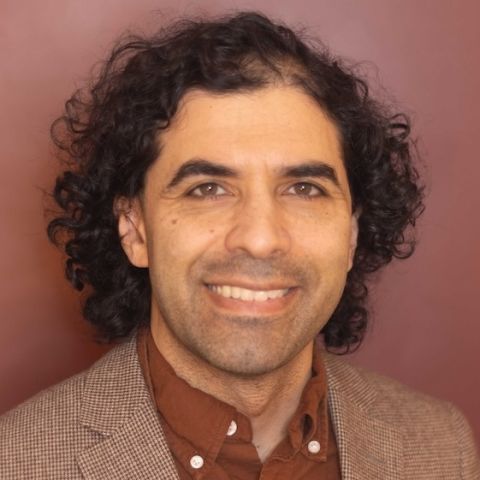About Shomir
- Coordinator, B.S. in Information Technology Ethics and Compliance
- Director, Human Language Technologies Lab
- Ph.D., University of Maryland
- Joined the College of IST in 2018
Your favorite courses to teach
Introduction to Information, People, and Technology (Honors)
I taught this several years ago as an overview “big ideas” course about the major topics in computing technology and how it affects our everyday lives. We had students from many different majors, and that mix produced great classroom discussions.
Natural Language Processing (NLP) Meets the World
I had wanted to teach a course like this for over a decade before the opportunity came up in fall 2024. It was a general education course that covered the social impacts of NLP. We often discussed ethical decision making and changing social norms surrounding human language technologies.
Foundations in Computational Informatics
Our PhD program includes students who are deep into the technical aspects of computing and students who are mainly focused on the social aspects. I redesigned this course to serve both so students from both camps (and everyone in between) could critically reason about the abilities of computers and explain them to a wide audience.
Your Research Interests
-
Artificial Intelligence
-
Computational Social Science
-
Digital Privacy
-
Natural Language Processing
Most meaningful accomplishments in your…
…academic journey
Getting job offers for tenure-track positions. That was the goal of six years in graduate school and five years in postdoc positions. It took longer than I expected, but I knew what I wanted.
…professional career
Graduating student researchers. Undergraduates, MS students, and PhD students spend time on research with my lab, and it’s an honor to help guide their education.
…personal life
My travel. I’ve visited forty-six countries and lived on four continents. I’m still looking for opportunities to spend a few months in South America, Africa, and Antarctica, to complete living on all seven.
How the field of information technology…
…inspired you to become an active member in it
In third grade, I took a programming course in a computer language called BASIC. At first, I was afraid to write programs because I thought the computer would break if I did something wrong. My parents reassured me that I couldn’t cause any harm in BASIC, but a few years later I learned enough that I actually started breaking things.
…has changed since you entered it
I feel privileged that I’ve witnessed three major transitions in computing during my life—the rise of the commercial internet in the 1990s, the movement to wireless and mobile computing devices in the decade that followed, and the recent arrival of artificial intelligence as an everyday tool.
How AI is impacting…
…the way you teach
I’ve adjusted writing assignments in my courses to include an “AI option”—students are allowed to get feedback from tools like ChatGPT, but they must disclose it and explain how AI helped (or didn’t). I will use that feedback to improve future assignments.
…the way students learn
Some students prefer to use AI to help them write but some don’t, and I think that’s important to remember. I try to walk them through using ChatGPT or Copilot early in a course, so that they know it’s available, and I show them the limitations.
…your work as a researcher
I’ve been an AI researcher since early graduate school, but the meaning of that has changed over time. My earliest AI research involved logic-based knowledge representation and reasoning. Then machine learning made a huge impact on the field, and deep learning took over during the past ten years. My interests have grown over time from the fundamentals of AI algorithms to include how those algorithms fit into the systems that our society depends upon.
A Word of Advice
Wilson created pages on his website to help students, new faculty, and others understand "typically unwritten" customs and procedures in academia.
Interacting with Faculty
This was one of the first advice pages I wrote. I wanted to make my work easier by answering first-year undergraduates’ frequent questions about what faculty do and how to get the most out of talking with them. It got a much wider audience, though, and I’ve expanded it several times. Academia expects students to follow many customs and procedures, and I think it's important to tell students what we want.
Inglorious Proposals
This page receives the most feedback from other faculty. I wrote three case studies about grant proposals, to show the timeline and how much happens before the research funding begins. One of those proposals was funded on the first try, and another was funded on the second try. For the third, we tried seven times but it was never funded. Sometimes it pays to be persistent, and sometimes it’s appropriate to give up and try something different. The wider context helps make the decision.
Thoughts on Failure
This article has provoked more feedback from students than any other I’ve written. Sometimes people think of professors as impeccably smart or successful, but we encounter many obstacles along the way. It’s possible that I had more failure than most faculty. Briefly: My first round of PhD applications all failed, I finished my PhD without a job offer and spent three months unemployed, and I was on the academic job market for four years before I received my first tenure-track offer.

Inside the Human Technologies Lab
We work on natural language processing, the branch of artificial intelligence that examines human language. Applications include ChatGPT, Siri, and internet search engines.
I call our work “sociotechnical NLP.” Our projects focus on the human context of NLP, both how it fits into complex social systems and how it can help people understand complex topics.
We’re always looking for collaborators and resources and have worked with people in law, public policy, linguistics, the physical sciences, and engineering. Our collaborators are based in academia, public policy, government, and industry.
Mentioned in this story
Make a Gift
When you support to the College of Information Sciences and Technology, you make an impact greater than a simple transaction. No matter the size of your gift or what you support, your gifts drive us forward, making the college—and the world—a better place.



